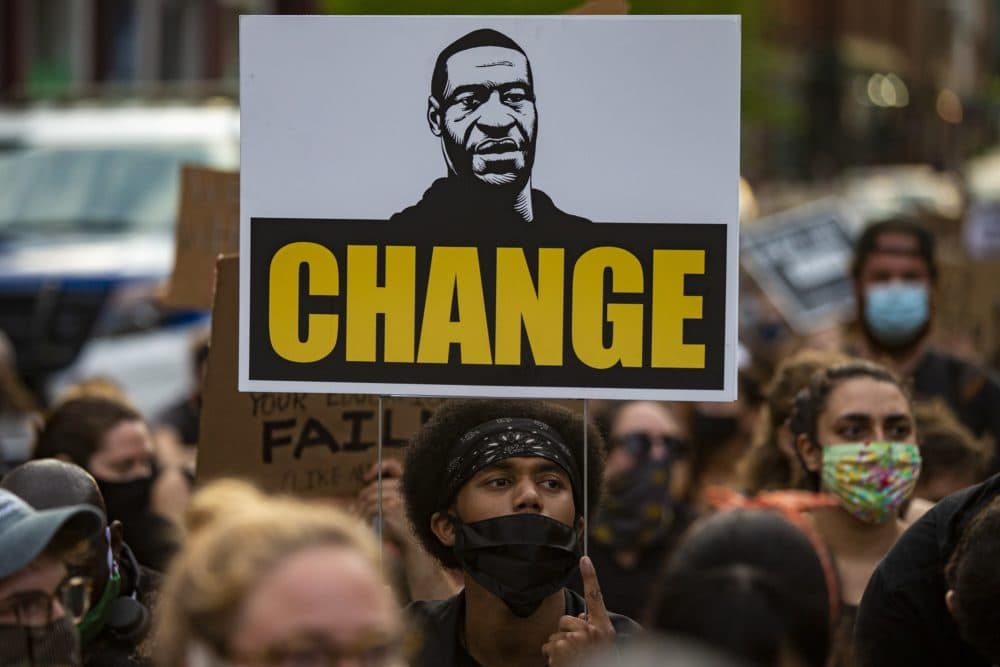Advertisement
How Reforming Qualified Immunity Could Transform Policing In America
Resume
For more than half a century, so-called qualified immunity has shielded police officers from lawsuits. Now, Congress and some state houses are considering changing that. We discuss how reforming qualified immunity could transform policing in America.
Guests
Joanna Schwartz, professor of law at UCLA School of Law. (@JCSchwartzProf)
Rep. Leslie Herod, Colorado State Representative. Chair of the Colorado Black Democratic Legislative Caucus. (@leslieherod)
Also Featured
Clark Neily, senior vice president for criminal justice at the Cato Institute. (@ConLawWarrior)
Major Brian Scott, of the Maine State Police.
Interview Highlights
What is the legal definition of qualified immunity?
Joanna Schwartz: “Qualified immunity is a doctrine that the Supreme Court created in 1967. At the time, they called it a good faith immunity for constitutional violations. But now the way the court has defined qualified immunity, it protects government officers, including law enforcement, from damages, civil damages. So it doesn't apply to criminal cases, unless an officer has violated what the court calls clearly established law.”
On what’s driving the movement to reexamine qualified immunity
Joanna Schwartz: “I have not seen any momentum resembling this. And qualified immunity has been in existence since 1967. And even as it's gotten stronger and stronger, the objections to the doctrine have really been raised by lawyers and by academics. In the latest presidential campaign, there were some Democratic candidates who included reform of qualified immunity to their list of criminal justice reforms, which was surprising and very welcome for those of us who have studied this issue.
"But qualified immunity really broke onto the national scene after the killing of George Floyd in May of 2020. And there you started seeing signs lifted in protest across the country saying 'End Qualified Immunity.' And if I could diagnose why it is that qualified immunity has really taken center stage in discussions about police accountability, I think that the obvious injustice and really an unsensible nature of the doctrine, the idea that someone would be denied relief simply because they have the bad luck of not being able to find a prior court decision with virtually identical facts.
"And the really tragic and horrific facts of cases in which people were denied relief because of qualified immunity, I think has gathered so much steam behind reform of the doctrine. But it's also worth noting that there are many, many other barriers to relief in these cases. And so, although qualified immunity absolutely deserves the top billing that it's receiving in conversations about police accountability and reform, ending qualified immunity on its own will not usher in a golden age of police accountability. There are many other aspects of the system to fix.”
On efforts to reform qualified immunity in Colorado
Rep. Leslie Herod: ”Last year, with Senate Bill 217, immediately after the murder of George Floyd, and the uprisings that happened across the country, including right here in Denver, we passed a bill that ended qualified immunity for local law enforcement officers at the state level. Additionally, we required personal responsibility for law enforcement officers who act in bad faith of up to $25,000. So they personally would have to pay $25,000 into any settlement or any judgment against them for, again, acting in bad faith and harming someone in our communities.
"Our measure was passed with bipartisan support. Democrats and Republicans both signed on to this provision, as well as the entire bill, which had other police reform measures in it as well. And quite frankly, it wasn't opposed by any law enforcement lobby in the Capitol. Now, I'm not saying they were supportive, but they were not opposed. And I believe it was clear across the state of Colorado that people wanted to make sure that law enforcement officers were personally responsible for doing harm in the community, especially when they knew the harm they were doing, and that harm was intentional.”
On how qualified immunity shapes police culture, and the benefits of eliminating it
Joanna Schwartz: "Qualified immunity, I think, has a lot of insidious effects on police culture. There are all of these high profile court decisions, Supreme Court decisions, with tragic facts, with people who have been killed. Where the Supreme Court or other federal courts say, too bad you get no relief, there's no consequence for this officer's conduct. And that's got to send a message. Justice Sotomayor said that the Supreme Court's qualified immunity decisions send a 'shoot first, think later' approach to policing. They endorse that kind of approach. And that's the kind of approach that I think ending qualified immunity would limit.
"It also would clarify the scope of constitutional protections. Right now, courts can grant qualified immunity without ruling on whether the law was violated. So there are all sorts of kinds of constitutional violations that have not been clearly established, which means that they haven't been clarified to police departments. There are parts of the country where it's not clear whether recording a police officer is constitutionally protected activity. And that's squarely because of qualified immunity. If there is an elimination of qualified immunity, there's going to be more clarity about the law."
From The Reading List
Los Angeles Times: "Congress sees momentum on police reform, but officer immunity still an obstacle" — "Although congressional negotiators remain optimistic about reaching agreement on a police reform bill in the coming weeks, many of the issues that divided Democrats and Republicans last summer when they first tried to pass policing reform after George Floyd’s murder remain sticking points."
Law360: "State Lawmakers Tackle Qualified Immunity Defense" — "The murder of George Floyd last summer by Minneapolis police officer Derek Chauvin ignited a wave of state actions designed to reform policing and the ways governments hold law enforcement accountable. Legislatures across the U.S. passed bills addressing use of force, chokeholds and no-knock warrants."
The Appeal: "Qualified Immunity: Explained" — "On the morning of Nov. 23, 2004, Malaika Brooks was driving her 11-year-old son to school when Seattle police pulled her over for speeding. When the officers gave her a ticket and asked her to sign it, Brooks refused, believing that she had been wrongly pulled over and thinking, mistakenly, that her signature would be an admission of guilt."
Amsterdam News: "The invisible shield: how activists and lawmakers are breaking down qualified immunity, Part 3" — "Laws to eliminate qualified immunity as a defense were proposed almost as soon as the doctrine became a significant shield that protects law enforcement officers from being sued by those whose federal constitutional rights they violate."
This program aired on May 5, 2021.

